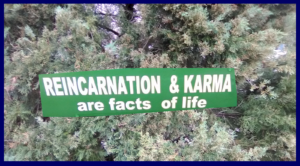A famous actress recently made a mistake. She let slip her idea of karma meant that a horrific natural disaster with a high death toll was an act of divine retribution. She’s not the first to make such a poorly thought out the assertion. No doubt she genuinely supposes she understands the concept and is a firm believer. Her mistake is a matter of confusing other spiritual theories with eastern beliefs. Judeo-Christian religious influences often bias Westerner’s belief in the theory of karma.
Important Role of Karma
In several Eastern traditions, karma plays an important role. In the same way, the word ‘spirit’ may have a different connotation for different sects of Christianity in Western culture so too can the idea of karma differ in Eastern traditions.
 Hinduism, Sikhism, Buddhism and to an extent Taoism each observes a concept of karmic law.
Hinduism, Sikhism, Buddhism and to an extent Taoism each observes a concept of karmic law.
You can spend a lifetime studying different theories of karma.
The easiest way to conceptualize the term itself is to consider it being either ‘action’ or ‘deed’. Westerners are accustomed to the idea of reward and punishment in the form of heaven and hell.
It’s easy to incorrectly grasp the idea of karma as a sort of celestial police officer or judge punishing the guilty. Instead, karma is the balance between actions and energy created or dispersed.
Imagine a basin sitting in front of you. Fill the basin halfway to the top with clear water. Now place an imaginary small toy boat in the middle where it can float gently without bumping into the edges. Put a miniature version of yourself on the boat and we can begin explaining karma.
Let’s have this ‘mini-you’ throw a good size rock from the boat into the water. You watch as energy from the stone hitting the water creates a decent size wave. The wave hits the side of the basin dispersing energy. The waves appear to return first from the side then behind you as well.
The energy from this one action of yours will continue to influence the flow and movement in our basin for several minutes. To an extent, this is how karma works. If another boat with its small occupant appeared in the basin then you’d have to experience the results of his stone-throwing experiments, just as he’d have to put up with yours. This interaction between you and the other tiny captain also demonstrate karma in the way you influence each other just as your impact on what happens in the basin.
In watching the action of the waves you created you were motivated to change or modify the act of throwing the stone. This is another aspect of karma in observing and changing your actions. This doesn’t mean you can always change the outcome simply by governing your own actions.
Go back to Past
In a real-life demonstration let’s go back to the past. Think of yourself walking through a park a few decades ago and finding the connected plastic rings for a six-pack of soft drink cans. Attempting to do a good deed you tossed them away in a nearby trash bin. You didn’t realize then was the threat to wildlife, they’d pose. A bird caught in the rings died a slow painful death. Your act resulted in the unnecessary suffering of another creature, so what should your punishment be for this offense? Should a divine type of justice strike you down O’Henry style in some ironically similar fashion?
 Going back to our basin we can see what we need to understand and karma isn’t going to wipe us out for our small innocent action despite its unintentional consequence. The reaction won’t be so much stronger than the action. This force known as karma isn’t a petty or vindictive judge bent on disproportion retribution.
Going back to our basin we can see what we need to understand and karma isn’t going to wipe us out for our small innocent action despite its unintentional consequence. The reaction won’t be so much stronger than the action. This force known as karma isn’t a petty or vindictive judge bent on disproportion retribution.
What a crime could a person dying crushed and broken under rubble have committed to deserve such a fate? There is nothing any person could have done no matter how diabolical to deserve dying alone trapped in ruins or to return home and find all their loved ones dead. Moreover, why should the people of land suffer for the deeds of their leaders? Why would the many suffer for the deeds of a few and how could this be a just or balanced system? When you consider it this way you wonder why we’d want to believe in such a malicious theory. However, an actual study of karma shows this entire line of thought is untrue.
We would as human beings like to have a sense of control, and here’s where the line can be blurry. We want a reason for calamity, because if there is a rationale then all we have to do is avoid the cause. It would be nice to suppose we could avoid all accidents or illnesses by keeping to a certain set of actions or that by following certain rules, and then we’d be safe. We could also justify a lack of response to those in need if we assert that somehow they deserve their circumstances.
In our basin we are in a confined world.
We are fortunate to have a reality that’s far more interesting. Outside of our basin, the world is much more complicated though, and we can’t control everything. For instance, we can affect nature, but we don’t control it entirely. We can mediate our fate by closely observing our actions and their results, but trying to control everything in our world isn’t studying karma. Karma is ultimately a study of where we fit in the world.
Knowing we all share one ‘basin’ and need to show respect to all is karma. Looking for ways to assign blame is not. There is a chance to learn from watching the actions of others and the power of nature. A true belief in karma means bringing a balance to our behavior, having empathy for others, and a sense of peace within ourselves.






